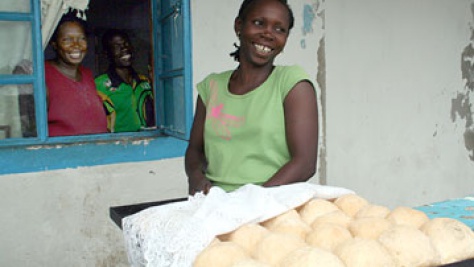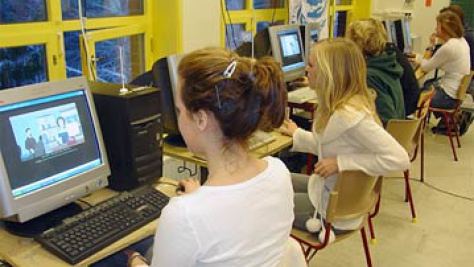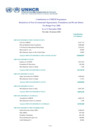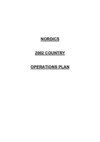Angolan peace-building efforts shift from repatriation to reintegration
Angolans across the country are working together to build a common future after the devastation of nearly three decades of war. Reflecting this, the work of UNHCR is shifting from repatriating the hundreds of thousands of Angolans who fled the war, to helping them reintegrate with those who stayed behind.

Profits from a bakery at a women's centre in Cazombo, Angola are being used to help run the centre, ensuring it continues operating after UNHCR ends its involvement. © UNHCR/J Redden
CAZOMBO, Angola, Mar 16 (UNHCR) - Early in the morning Angolan men and women file into a compound in this remote town. It is a mixed bunch - former refugees; those who had fled fighting to other parts of their country; and those who stuck it out through years of war. But they all share a common aim: to build a better future.
One group of men gather under a tarpaulin to get hands-on experience in repairing motorcycles; nearby another group stand at work benches learning carpentry. Inside a classroom in the women's centre which was the first structure built in the compound, men and women receive instruction in fish farming.
All are intent on acquiring skills that will ensure a livelihood as one of the poorest parts of one of the world's poorest countries emerges from nearly three decades of war. It is also a way to reintegrate those who fled to neighbouring countries back into a region that was torn first by a struggle against the former Portuguese colonial rulers and then by years of brutal civil war.
The training project in the remote province of eastern Angola, started by UNHCR with funds provided by Norway's Statoil oil company, reflects the shift in the priorities of the UN refugee agency this year. It is a step on from the voluntary repatriation of Angolan refugees over the previous three years which was just the first step in their return to normal life.
When a peace agreement was signed in 2002 to end the 27 years of war, there were an estimated 457,000 Angolans living as refugees outside the country's borders. Since then more than 360,000 are estimated to have come home, including 123,000 brought back by UNHCR, 89,000 who returned on their own but received UNHCR assistance on arrival, and a further 149,000 who repatriated without any UN help.
Now the focus is on reintegrating these people into Angola - and ensuring that the process will continue after UNHCR's role is over. In an era of shrinking donor interest in Angola that means UNHCR must target its resources carefully - using them to start projects that will become self-sufficient, provide a model for other organisations and attract funding from other sources.
"It's a challenge," said Enrique Valles, the UNHCR official in the capital Luanda who is in charge of planning sustainable reintegration. "We have to play a catalytic role and be creative, to establish strong links as much as possible with our partners."
UNHCR is a humanitarian agency providing legal protection to refugees, while prime responsibility inside the United Nations for development falls to other agencies. The end of the official repatriation last December signalled the start of a phasing-down operation that will see UNHCR's current offices in the interior of Angola closed by the end of 2007, leaving only the main office in Luanda.
But the development needs of Angola are vast. Last year's UN Human Development Report showed the country had improved - but it was still the 160th least-developed country of 177 that were monitored. Life expectancy is about 41 years, and a quarter of children do not see their fifth birthdays.
Angola is more fortunate than many countries emerging from war because it has a rapidly growing economy fed by rising oil and diamond exports, which are soon to be joined by natural gas production. UNHCR works closely with the government which has announced major infrastructure, health and education investments. The work will take years.
UNHCR, with the greatest presence on the ground of the UN agencies, has taken a lead in the international effort to assist the government through projects it hopes will be catalysts for involving other organisations. It has agreed with the government to spend 80 percent of this year's $12 million budget for Angola to support basic services, promote self-reliance and build up local capacity in the main areas where refugees have returned.
For example, the vocational training centre in Cazombo should eventually become self-sustaining, raising enough from students to cover the costs of the teachers and maintaining the facilities.
The Women's Empowerment Centre that hosts the training has attracted a group of women who are learning to make garments to sell and are baking bread every second day to fund the centre. They are currently accumulating the income in order to start similar women's centres in other areas.
UNHCR has teamed up with the UN Food and Agriculture Organisation to spur farm development in a country that has vast potential but huge tracts of abandoned land. Again, the work will have to continue long after the UN refugee agency has ended its initial reintegration programme.
Non-government organisations working with UNHCR have also provided Portuguese lessons to refugees who were born abroad and grew up speaking either French in the Democratic Republic of the Congo or English from their time in refugee camps in Zambia.
UNHCR's goal is to initiate what will be a lengthy process of reintegration.
However, in the battered towns where mines are still being cleared or in the villages that were deserted during the war, returning refugees see reintegration in concrete terms of the crops, houses, schools and clinics they need. They may be happy to back in their homeland, but they are also looking for continued support to ensure that they have a future. UNHCR knows its activities are just a start.
By Jack Redden in Cazombo, Angola
Related news and stories
Football brings refugees and host community together in Angola
First UNHCR repatriation convoy since 2020 leaves Angola for DR Congo
Hope for refugees in Angola as they receive COVID-19 vaccines
'All over the province, people want to buy our rice'
Refugees start blog to share information on coronavirus
UNHCR, partners seek US$621 million to support DRC refugees and hosting communities
Your search for « Statoil » matched 77 results. Displaying page 1 of 9 pages.
-

UNHCR Global Report 2008: List of corporate and foundation donations (over 100,000 USD, cash or in-kind)
Jun 2008 ... - Charities Aid Foundation (UK) 192,154 TV Asahi Welfare Foundation Doraemon-Bokin (Japan) 166,667 Statoil (Azerbaijan) 165,000 Cartier Foundation (United Arab Emirates) 155,000 Yanmar Co. ...... -

Angolan peace-building efforts shift from repatriation to reintegration
16 Mar 2006 ... The training project in the remote province of eastern Angola, started by UNHCR with funds provided by Norway's Statoil oil company, reflects the shift in the priorities of the UN refugee agency this ...... -
Surviving against the odds: a taste of life as a refugee
7 Dec 2005 ... Developed by UNHCR with financial support from the Norwegian company Statoil, the web-based educational tool gives young people a virtual experience of what it is like to flee one's home country and ...... -

Virtual game offers insight into refugee experience
15 Jun 2005 ... The third component of the package offers a teacher's guide with exercises founded on knowledge, empathy and understanding. Norwegian company Statoil supported UNHCR's Regional Office for the Baltic ...... -

Surviving against the odds: a taste of life as a refugee
7 Dec 2005 ... Developed by UNHCR with financial support from the Norwegian company Statoil, the web-based educational tool gives young people a virtual experience of what it is like to flee one's home country and ...... -

UNHCR picks up prestigious Austrian award for interactive game
22 Sep 2006 ... ... Schönbauer later acknowledged the support of corporate partners - such as Norway's Statoil - in developing and promoting the game. Statoil sponsored the Norwegian version and the original ...... -

2008 Contributions to UNHCR Programmes: Breakdown of Non-Governmental Organization, Foundations and Private Donors, as at 30 March 2009 (table)
30 Mar 2009 ... ... Total for PRIV DONORS THAILAND 207,868 PRIV DONORS AZERBAIJAN Statoil Azerbaijan 165,000 Total for ... Total for PRIV DONORS SINGAPORE 50,000 PRIV DONORS IRAN Statoil Iran 37,134 The Mexican Charity ...... -

2008 Contributions to UNHCR Programmes: Breakdown of Non-Governmental Organization, Foundations and Private Donors, as at 30 January 2009 (table)
30 Jan 2009 ... ... Run date: 30 January 2009 PRIVATE DONORS IN AZERBAIJAN Statoil Azerbaijan 165,000 Total for PRIVATE ... Total for PRIVATE DONORS IN SINGAPORE 50,000 PRIVATE DONORS IN THE REPUBLIC OF IRAN Statoil Iran ...... -

UNHCR Country Operations Plan 2002 - Nordics
1 Jul 2001 ... ... The expected positive impact will be felt gradually, with an agreement being signed between UNHCR and Statoil in 2001. Capacity building activities with asylum decision-makers have contributed to a ......
